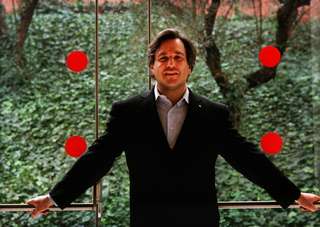|
Back
More volcanic eruptions! Zurich
Tonhalle
04/22/2010 - & April 16 (Lisboa), 20 (Wien), 24 (Napoli), 25 (Madrid)
Richard Strauss: Tod und Verklärung op. 24 – Ein Heldenleben op. 40
Dimitri Shostakovich Concerto for Cello Nr. 1 op. 107
Han-na Chang (Cello)
Gustav Mahler Jugendorchester, Antonio Pappano (conductor)

A. Pappano (© Laurie Lewis)
How very unlucky for this young orchestra on its Easter European tour to be prevented from performing in Paris and Amsterdam because of the Icelandic volcanic ash cloud. And how unlucky too for the concertgoers of Paris and Amsterdam not to have had a chance to hear this excellent young orchestra. The orchestra was apparently stuck in Lisbon for several days; eventually Pappano and Chang flew to Rome and then went by road to the next concert venue, Vienna. The orchestra had to fly to Dubrovnik for a tiring 18-hour coach journey to Vienna.
Luckily Zurich was scheduled after Vienna, two days later, and the members of the orchestra had a chance to recover from their ordeal and disappointment. They showed no signs of fatigue. In fact, they clearly relished the chance to show off the fruits of their evident painstaking rehearsals.
In winter 1888 Strauss had the idea of composing a short tone poem, eventually entitled Death and Transfiguration to illustrate the dying moments of a man who had “striven towards the highest artistic aims”. He completed the work a year later. The orchestra played with energy and enthusiasm, fine technique, my only quibble being that the string tone in the quieter passages was rather on the thin side. The timpanist was not held back for his outbursts, Pappano generally allowing the orchestra to play for all they were worth, rather than opt for too much subtlety and dynamic shading. The furious passage depicting the artist’s final struggle came over as though we were experiencing yet another volcanic outburst, apt in the circumstances.
Shostakovich’s First Cello Concerto is probably the most popular 20th century cello concerto along with Elgar’s. It is also one of the most difficult concert pieces, composed just after his 11th Symphony. It was written in 1959 for Rostropovich (who memorised it in an amazing 4 days!). The Korean cellist Han-na Chang, only 27, studied under Rostropovich and clearly some of the Old Master’s art has been passed on. She gave a masterly performance, watching the conductor intently at all material moments (she is studying conducting under Maazel). The difficult technical passages (such as the artificial harmonics) were played with consummate ease. Chang displayed just the right degree of anguish and aggression in the angular Allegretto and sufficient soulfulness in the slow movement. The audience and orchestra listened with rapt attention during the long Cadenza, clearly thrilled by Chang’s artistic prowess.
Strauss’ A Hero’s Life is a masterpiece of characterisation. Not exactly a modest man, Strauss once said he could set a menu to music. So not being modest, he chose his own life to which to set music. It was clear that a great deal of work had gone into the powerful opening, Pappano again choosing energetic tempi throughout the piece. He relished the work’s ebb and flow, the orchestra clearly enjoyed the percussive and brass outbursts and where appropriate played with more volume than heard at the Tonhalle for some while. Not surprising with nearly 130 players on stage.
Praise in particular must go to the Leader Carolina Kurkowski Perez who played the solo passages quite perfectly, with the Leader of the Tonhalle Orchestra watching admiringly from the back of the Gallery. The orchestra unites young talents from more than 20 European countries and on this showing is several cuts above their contemporaries from Venezuela.
The Gustav Mahler Youth Orchestra
John Rhodes
|